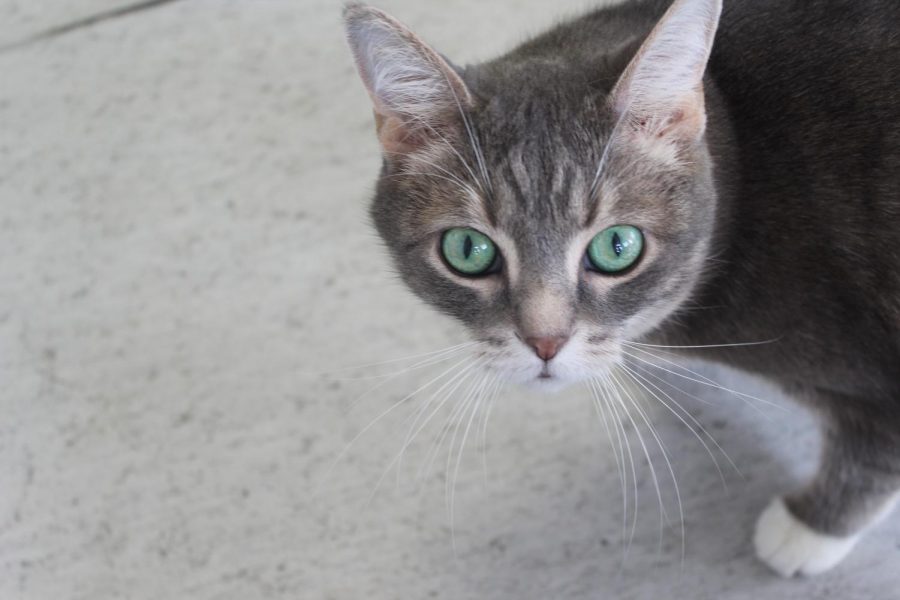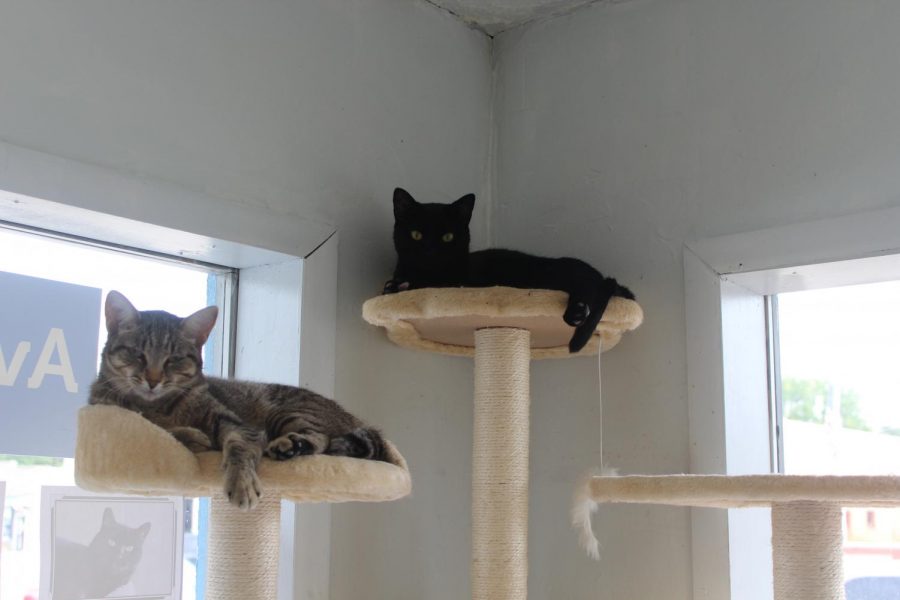Hancock County Humane Society
Four year-old Tabby Jewels says hi to the camera.
September 14, 2021
No matter who you are, we’ve all seen it — and we can all agree: the US has a very real homeless animal problem. The question should not be what we should do in the US, though, but what we can do in our state and our local communities to make sure that homeless animals are being taken care of. One way that you can do that is by supporting local no-kill shelters, like our own Hancock County Humane Society Shelter in Greenfield.
Hancock County Humane Society, also known as HCHS, is a no-kill, non-profit, cat-only animal shelter that has been fully volunteer run and donation funded since its creation in 1977.
“Our mission is to rehome and care for cats humanely,” Nikki Armstrong, a volunteer, said. “And we try to place them with good homes.”
There are several ways that students can help the shelter with their mission. From donating to adopting to volunteering, students can help HCHS continue to do the important work they do.
HCHS is fully funded by donations, and there are many different ways to donate. Anyone can donate cash or checks, made out to Hancock County Humane Society, either in-person or by mail. They also have more remote ways of donating online through either PayPal or AmazonSmile. People can also donate material not through Amazon, though, the materials should be brought in when the shelter is open, either Tuesday from 5:30PM to 7:30PM or Saturday from 10AM to 2PM.
Armstrong gave a list of what the shelter is most in need of. “For our cats here, we are always in need of litter; clumping litter, clay litter… specialized foods, like FancyFace kitten food, and, like, non cat related items, we could always use cleaning supplies and paper plates.”
In addition to the shelter itself, HCHS also has a food pantry located in-house that stocks food and other necessities for both cats and dogs.
“Our pet food pantry is fairly stocked,” Armstrong said, “but what we do tend to run lower on is canned cat food; we use a lot of it, obviously, for our cats here, and then anybody who’s fostering gets that free from the shelter.”
The shelter is open to donations to the food pantry on Saturdays, but is available to anyone using its resources whenever the shelter is open.
“Anybody who is in need is free to come in,” Armstrong said. “As often as they need it.”
Adopting is a big deal — choosing a companion who will stay with you for the rest of their life is no joke. That’s why, when it comes to adopting, Hancock County Humane Society has it down to an art.
“We have some information on our website about the cats and their personalities,” Armstrong said. “You make an appointment, and then you fill out an application, and then it gets processed by the board within the week, and then we schedule your adoption appointment.”
“After that,” she continued, “it’s always a two step process. You meet the cat first, and then we go through the application, and then we process the application, and then you come back for another adoption meeting. The second meeting, you take the kitten home.”
Hancock County Humane Society’s adoption fees are as follows: kittens or adult cats younger than 5 years old are $80, cats 5 years or older are $50 (excluding exotic cats), and special-needs cats are $25. Anyone 55 or older can adopt for a reduced fee of $50. These fees may not seem that small at first, but they cover the cost of the pet getting spayed/neutered, all age appropriate vaccinations, flea treatments, deworming treatments, ear mite treatments, microchipping, and any other medication as necessary; something which is valued at over $350, even though the adoption fee is, at most, $80. That’s saving at least $300, and $80 is a small price to pay for all the love a new lifelong companion can bring into your household.
Another great way to get involved in HCHS is to become a volunteer. Anyone can volunteer, even teens, making it a great way to not only help an animal shelter in need, but also to get community service hours for things like National Honors Society or college applications. Volunteers must be willing to commit to at least one 6 hour shift a month for at least 6 months.
For teens, Armstrong affirmed that as long as the student is 14 or older, they can volunteer without parental supervision. According to HCHS’s website, teen volunteers will do tasks such as emptying trash cans, restocking supplies, cleaning cat cages and litter boxes, cleaning and filling food and water bowls, sweeping, mopping, observing cat health, and checking that the cages are locked and the cats are accounted for. If any student is interested in volunteering, they can apply online with the shelter’s volunteer form. After that, a volunteer coordinator should get in touch to discuss how volunteering would work and dates.
Some pets the shelter are currently featuring include Jewels, Nadia, Victoria, Penelope, Zoey, Julianne, Fergie and Nellie (who come as a pair), and Jane Russell. If you want to read more about them or are interested in adopting them, click the links attached to their names or fill out the appointment application on their website.
To find more information about most of these cats, or other eligible cats, make sure to visit https://www.hancockcountyhumanesociety.org/animals/browse?Page=1&Status=Available. If their name isn’t linked, you can always contact the humane society to ask about them. There are several other cats at the shelter not yet listed on their website, though, so make sure to visit the shelter in person before considering who to adopt.
If you want to find more information, such as HCHS’s intake policy, visit https://www.hancockcountyhumanesociety.org/ or contact the shelter through email ([email protected]), phone (317-462-5404), or letter (Hancock County Humane Society; 214 E. Main St.; Greenfield, IN 46140).



